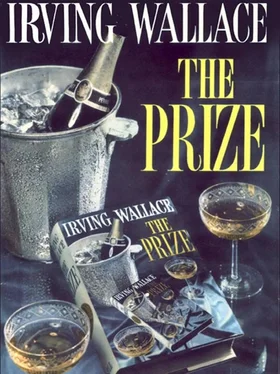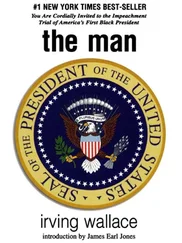Eckart’s feelings had been made clear, and Krantz’s shrewd judgment advised him to agree with his patron. ‘I am surprised as yourself,’ he said. ‘How could any scientist refuse so magnificent an inducement?’
‘We dug our own grave,’ Eckart mused, almost to himself. ‘I always knew they went too far with their liquidation of undesirables. They should have screened more carefully, looked ahead. It was madness, and we are the heirs to it.’ He met Krantz’s eyes. ‘Stratman will not forgive Germany for killing his sister-in-law, and Russia for killing his brother. This niece who survived-he spoke of her as Emily-it is she, I suspect, who keeps the unreasoning hatred burning within him. He is subservient to his military masters, I am certain, and prattles on about the wonders of America, and the virtues of capitalist democracy but that is all camouflage. He is a German still. Our fault is we made him a Jew, also.’
‘Was his refusal absolute?’
Eckart was silent a moment, staring through the windshield. ‘So he says, so he says.’
‘Then it is impossible,’ said Krantz. ‘There are other talents. You must turn your mind elsewhere.’
‘No,’ said Eckart angrily. ‘There is one Stratman. There is not another.’
‘But hundreds of physicists have worked in solar energy. Perhaps if you hired-’
Eckart turned on Krantz with a fierceness bred of frustration. ‘Are you a fool? Do you not see what we are after? Stratman alone has the key. The door he has opened for our enemies he has closed to us. Some day we will find that key. But it is the many other doors he can now open that worry us. We want him in East Berlin not for what he can give us of his discovery. No. Not even for what he can give us in new discoveries. We want him with us so that he will no longer work for them, help them, arm them. We want him not as an addition to us, but as a subtraction from them. That is what we want, and that is what we will have. Why do you think I am telling you all this? Because we have hope, still, and we know we have you, as a friend, a future colleague, to depend upon.’
Krantz received the last with mingled pleasure and misgivings. ‘What more can I do for you? I have done my part.’
‘Only a share of your part,’ said Eckart roughly. ‘Your work is done when we are satisfied. We are not yet satisfied.’
Krantz felt himself pulling at his goatee, and he knew his hand was trembling. ‘That is not so, Hans, that is not so, and you know it. It was an exchange of favours. I had a simple demand, and you made a difficult one. You asked me to make certain that Stratman won the Nobel Prize in physics and came to Stockholm to collect it. That is what you asked me, and no more. In return, you promised me a full professorship in the physics department of Humboldt. I have done my whole part, and now you should do yours.’
‘Really, Carl, I respect your meticulous and matter-of-fact mind, I respect it highly,’ said Eckart, his tone softening and sucking, ‘but there are limits of exactness in the human relationship. We are not measuring molecules. We are concluding a-a happy trade. Yes, it is true, you have brought Stratman here. To your eternal credit. But as long as he is still here, and not compliant to our wishes, he is still a matter of contention. In a broad sense, he is not delivered.’
‘He is delivered. He is here.’
‘Fleetingly. Why this resistance, Carl? You do not even know what I want of you.’
‘My position is precarious, that is all I know,’ said Krantz. ‘I have gone as far, in my position as a Nobel judge, as is humanly possible. What more can you want of me?’
‘A minor request, a routine performance, and nothing else. Were I in a position to carry it out, I would do so. I am an outsider here. You are still an insider. A task that is formidable for me becomes easy for you. And this I can promise you, Carl-acknowledge your responsibility to finish the work you have begun-finish it-and before I part company from you and your capital city, I shall offer you the contract for your chair at Humboldt and a residence visa to East Berlin. Now, what do you say to that?’
Krantz knew that there was no bargaining. He must go on, or forfeit his dream of the future. Well, he told himself, it would all depend on what was demanded of him. ‘Exactly what is it you want me to do?’
‘All yesterday afternoon and evening, I have given the problem my full mind,’ said Eckart. ‘The problem is one of providing greater inducement for Stratman. What can we offer him that he cannot reject? This is the scientific and civilized approach to the problem. But to make the proper offer, I have told myself, I must know more of the man and his requirements. What are his needs? What does he want? For what would he trade his allegiance? What are the necessities and luxuries that would bring him to our side? These questions are the ones I wish you to find answers for, Carl. When I have them, I will arrange a second meeting with Stratman. This time, I will have the bait. I guarantee you, it will hook him.’
‘How can I find out about Stratman’s wants? I am not a detective.’
‘You were once, not long ago. You can learn his wants by learning about his life, and the lives of those around him, like the niece, anyone else. After all, you told me yourself that when you had to find out about the Spanish physicist and the two Australians, you found a way, and the information was useful. Now, that is all I require of you again. Is it so much?’
‘I see,’ said Krantz, thinking. ‘If that is all-’
‘That is all.’
‘It might be possible. I suppose I could employ the Hungarian again-Daranyi. He is experienced, a workhorse, and he has sources.’
‘Is he reliable?’
‘Perfectly. I have said, his residence here is dependent upon several like myself. And he is always desperate for money. You would supply cash for the services, of course?’
‘Money is not an issue. Within reason, that is.’
‘How soon do you need this dossier on Stratman?’ Krantz asked.
‘How soon? Yesterday, if that were possible.’ Eckart’s Prussian face sniffed slightly in heavy humour, and then it relapsed into severity. ‘Let me see. What is today? The sixth of December? By the night of the ninth, no later.’
‘Three days for such a job? Impossible.’
‘Nothing like this is impossible, and you know it. I must have the information by the ninth, so that I can engage Stratman that evening, or the morning of the tenth. By the afternoon of the tenth, he will have the prize, and the next day be gone. He told me so himself. You can try, Carl. You can do your best.’
Krantz sighed. ‘I will try,’ he said.
‘When you brief the Hungarian-or anyone else you hire, for that matter-you must be clever, clever and cautious. Your agent must not know precisely what you are after. You understand? The slightest slip could be an embarrassment for me-for both of us. But do not fret. What is this, after all? An innocent little sport. A harmless research to give us some psychological understanding of Stratman. It will not be difficult for one of your stature and mentality. Already, I look forward to the day when you are in Berlin with us. You and Stratman, our proudest advertisements. How your Swedes will envy you then, eh, Carl?… Now, drive me back to the hotel. You can drop me off a block or two before. Remember to telephone me tomorrow, after you have made the arrangement. I will be waiting… Now, Carl, let us relax and speak of other things. Are there any worthwhile revues in Stockholm this season? And the girls-how is the current crop of Nordic beauties, my good friend?’
The embossed invitation, engraved on the most expensive linen paper, had gone out to twenty guests.
Читать дальше












